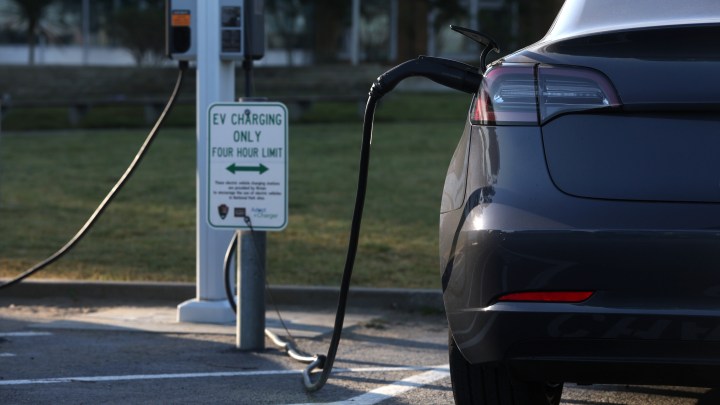
Where does the U.S. stand in the race toward electrification?
Where does the U.S. stand in the race toward electrification?

We’ve been reporting on the sweeping $750 billion law on health care, taxes and climate change – termed the “Inflation Reduction Act.” It also includes money for people who buy electric cars, but not all electric cars.
It turns out that only a fraction of the EVs sold in the U.S. will qualify for tax credits because eligible cars have to be made in America. There are also rules about where the batteries in these electric vehicles come from. Right now, the majority of battery parts and minerals come from places like China, which would result in many other electric car purchases being ineligible for tax credits.
For more on this Marketplace’s Andy Uhler spoke with Howard Crosby, a battery metal and mining expert of 25 years. He’s also the founder and executive director of Gold Express Mines, multi-commodity mining company. The following is an edited transcript of their conversation.
Andy Uhler: The U.S. just doesn’t produce a whole lot of battery production capacity, why is that?
Howard Crosby: One of the critical elements for the transportation batteries that are used right now and things like the Tesla’s and some of the other electric vehicles that you see on the road, require a certain amount of cobalt. And right now, pretty much 100% of the world’s supply of cobalt comes from either the Democratic Republic of the Congo, or from Russia. As far as lithium goes, and lithium is primarily produced from deposits that are called lithium salt deposits or brine deposits. We have some of those here in the United States. And in fact, the lithium brine salt deposits in Bolivia are substantial enough to support the world demand for lithium for the next 400 or 500 years. The problem, of course, is that nobody can do business in Bolivia at the moment, it’s just too difficult of a place to work, politically.
Uhler: It sounds like there’s been a push to move away from those critical minerals, cobalt and lithium, and maybe use something else. Is that what you’re hearing? Is that what you’re seeing too?
Crosby: Well, I think it is. But regardless of what battery ends up being the winner, you’re going to require an awful lot of copper. An electric vehicle uses four times as much copper as a conventional car. Anything that involves electrification involves copper, so it’s not just transportation electrification that we’re talking about here, we’re talking about electrifying a whole lot of other things to get away from fossil fuels. I mean, I know a quote that came out and Goldman Sachs said that copper is now the new oil. And the reality is there just isn’t enough copper and there won’t be enough copper, under any circumstance that I can imagine.
Uhler: Is there a way for onshoring to happen here in the United States? Is there a way for us to partner with I guess, friendlier countries, and make sure and ensure that the environmental standards that we put here are sort of abided by? Or is it really just a matter of sort of where those minerals are?
Crosby: I think it’s the latter, frankly. I mean, no matter how much we like — I mean, you know, we could take steps to aggressively for instance, advanced permitting and development of the copper cobalt deposits that are in Lemhi county, Idaho. Whether we could get anywhere near to the point where there would be enough production to make up for everything that we’re going to need is an open question. Now, we do have substantial endowment of copper, which is obviously going to be the most important metal going forward, if we’re going to electrify the planet, anything like the scale that has been talked about. There just is no substitute for copper.
There’s a lot happening in the world. Through it all, Marketplace is here for you.
You rely on Marketplace to break down the world’s events and tell you how it affects you in a fact-based, approachable way. We rely on your financial support to keep making that possible.
Your donation today powers the independent journalism that you rely on. For just $5/month, you can help sustain Marketplace so we can keep reporting on the things that matter to you.











